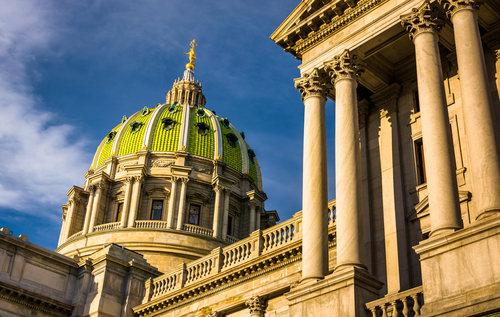
Gov. Tom Wolf on Monday signed into law budget bills that will fund state government operations without tax increases for the remainder of the fiscal year that ends in June 2021, following a rare fall budget session within the General Assembly.
“We must do everything in our power as a Commonwealth to get the state back to work,” Senate Majority Leader Jake Corman (R-34) said. “Just as Pennsylvanians have worked to live within their budgets, we too focused on finalizing a budget that would continue to serve our residents without asking them for more of their hard-earned dollars.”
The completed budget was initiated with the enactment of a five-month interim budget on May 29, agreed upon by the state Legislature and the governor. Senate President Pro Tempore Joe Scarnati (R-25) noted that the final budget represents a 9.8 percent decrease across operating appropriations from Wolf’s initial budget request from February 2020.
“The action taken in May allowed us time to gain a clearer financial determination of the Commonwealth’s finances in order to more accurately project revenue estimates before developing our final spending plan for the remainder of Fiscal Year 2020-21,” Senate Appropriations Committee Chair Pat Browne (R-16) said. “We now have a financial outlook that improved dramatically during those five months with both the Independent Fiscal Office’s and Department of Revenue’s fall revenue estimate projections improving by nearly $2 billion.”
Specifically, the completed $35.5 billion state budget for the current fiscal year, which runs from July 1, 2020 to June 30, 2021, would appropriate $32.1 billion in state funds and $3.4 billion in federal stimulus dollars.
The budget bills, House Bill 2536 and Senate Bill 1350, fully fund schools and education, as well as public health and community safety; protect Pennsylvania’s most vulnerable (especially in a pandemic) by funding vital health and human service programs; allocate $1.3 billion in remaining CARES Act funding for public health and safety frontline workers; reduce total spending by more than $760 million, approximately 2.1 percent less than the 2019-20 fiscal year; and include no new increased taxes or fees.
“When we passed our first appropriation five months ago, it was nearly inconceivable that we could have achieved a full-year spending plan absent tax increases, public borrowing or substantial cuts,” House Majority Leader Kerry Benninghoff (R-Centre/Mifflin) said. “Accomplishing such a feat now is a testament to the perseverance of the people of Pennsylvania and the dedication of the members of the Pennsylvania General Assembly to work for the benefit of all Pennsylvanians.”
The budget is balanced using $531 million transferred in available special funds. Additionally, the state’s Rainy Day Fund will have $243 million remaining.
Senate Democratic Leader Jay Costa, Jr. (D-43) acknowledged that it is not the budget that Senate Democrats wanted nor is it a budget that provides enough assistance to those struggling financially from the COVID-19 pandemic.
“But it is a budget that reflects the crisis that we are in,” Costa said. “With limited options for revenue and programs that desperately needed funding, this was the version that had the support needed to pass both chambers, keep state government programs in operation and prevent massive furloughs and layoffs of state workers.”
Costa continued, stating that it is a missed opportunity to not utilize the remaining $1.3 billion in CARES Act funding to balance the budget by using it to fund direct assistance programs for small businesses, schools, hospitals, homeowners, and renters.